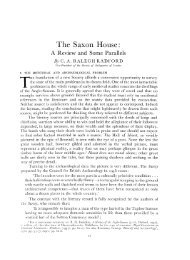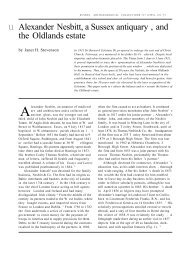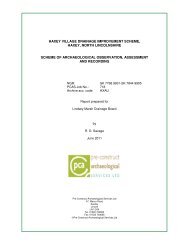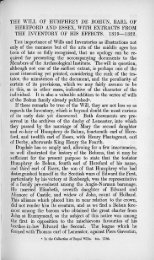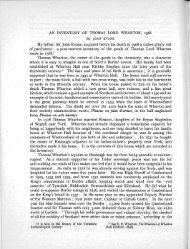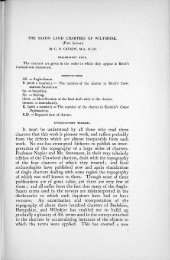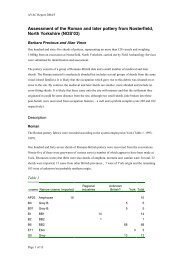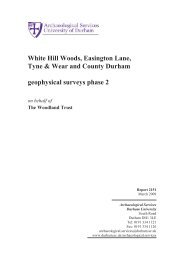ROMAN URBAN TOPOGRAPHY in Britain and the western Empire
ROMAN URBAN TOPOGRAPHY in Britain and the western Empire
ROMAN URBAN TOPOGRAPHY in Britain and the western Empire
You also want an ePaper? Increase the reach of your titles
YUMPU automatically turns print PDFs into web optimized ePapers that Google loves.
Salway: Geography <strong>and</strong> <strong>the</strong> growth of towns, with special reference to Brita<strong>in</strong><br />
I earlier suggested a powerful streak of <strong>the</strong> rational <strong>in</strong><br />
<strong>the</strong> religious practices concerned with <strong>the</strong> choice of a site. I<br />
should now like to look briefly at <strong>the</strong> o<strong>the</strong>r side of <strong>the</strong> same<br />
co<strong>in</strong>: <strong>the</strong> side where <strong>the</strong> Romans thought <strong>the</strong>y were<br />
operat<strong>in</strong>g on scientific l<strong>in</strong>es. Return<strong>in</strong>g to our example<br />
from Vitruvius about <strong>the</strong> sett<strong>in</strong>g out of a town relative to<br />
<strong>the</strong> w<strong>in</strong>ds, we read (i-4.1-6) that<br />
. . . if <strong>the</strong> town is on a coast <strong>and</strong> faces south or west, it<br />
will be unhealthy, because <strong>the</strong> sou<strong>the</strong>rn sky <strong>in</strong><br />
summer heats up as soon as <strong>the</strong> sun appears <strong>and</strong><br />
burns at midday. A <strong>western</strong> aspect is warm after<br />
daybreak, hot at noon, <strong>and</strong> glows with <strong>the</strong> sett<strong>in</strong>g<br />
sun <strong>in</strong> <strong>the</strong> even<strong>in</strong>g. . . In summer everyone grows<br />
weak from <strong>the</strong> heat as much <strong>in</strong> healthy spots as<br />
unhealthy; <strong>and</strong> <strong>in</strong> <strong>the</strong> w<strong>in</strong>ter even <strong>the</strong> most unhealthy<br />
places are better for <strong>the</strong> solidity given by <strong>the</strong><br />
cool<strong>in</strong>g process. People who move from cold countries<br />
to hot cannot endure <strong>the</strong> climate but fade away;<br />
while those who go from hot regions to <strong>the</strong> cold of<br />
<strong>the</strong> north lose noth<strong>in</strong>g - <strong>in</strong>deed <strong>the</strong>ir health benefits<br />
from it.<br />
. . . all bodies are composed of <strong>the</strong> four elements,<br />
heat, wetness, earth, <strong>and</strong> air, but <strong>the</strong>re are different<br />
mixtures accord<strong>in</strong>g to <strong>the</strong> nature of <strong>the</strong> particular<br />
creature. . . . If, <strong>the</strong>n, one of <strong>the</strong>se elements - heat -<br />
predom<strong>in</strong>ates over <strong>the</strong> o<strong>the</strong>rs, it destroys <strong>the</strong>m.<br />
On this argument one might expect <strong>the</strong>re to have been a<br />
great flourish<strong>in</strong>g of <strong>the</strong> cities of <strong>the</strong> nor<strong>the</strong>rn part of <strong>the</strong><br />
<strong>Empire</strong>, stimulated by a mass <strong>in</strong>flux of literate hypochondriacs.<br />
But we cannot w<strong>in</strong>. Vitruvius goes on to argue<br />
(i.6.2-3) that<br />
W<strong>in</strong>d is air <strong>in</strong> constant motion, flow<strong>in</strong>g here <strong>and</strong><br />
<strong>the</strong>re without end. . . . By shutt<strong>in</strong>g out w<strong>in</strong>ds from<br />
our houses we shall make our city healthy for those<br />
who are already fit arid also help those who perhaps<br />
suffer from diseases brought on by unhealthy locations<br />
elsewhere. . .to become well aga<strong>in</strong> from <strong>the</strong><br />
mildness caused by exclud<strong>in</strong>g <strong>the</strong> w<strong>in</strong>ds . . . . In<br />
unhealthy places, <strong>the</strong> air is polluted by be<strong>in</strong>g<br />
constantly stirred up by <strong>the</strong> w<strong>in</strong>d <strong>and</strong> debilitates <strong>the</strong><br />
sick day by day. A mild, thick air, however, which is<br />
free from draughts <strong>and</strong> cont<strong>in</strong>uous movement,<br />
restores <strong>the</strong>ir bodies by build<strong>in</strong>g <strong>the</strong>m up with its<br />
own unshift<strong>in</strong>g stead<strong>in</strong>ess <strong>and</strong> br<strong>in</strong>gs such people<br />
back to health.<br />
So Vitruvius would have <strong>the</strong> potential founder of cities<br />
seek a cold climate with no draughts! On <strong>the</strong> whole, it<br />
must have been easier to trust to <strong>the</strong> guidance of <strong>the</strong> gods<br />
than follow <strong>the</strong> dictates of contemporary science. But <strong>the</strong><br />
po<strong>in</strong>t I am try<strong>in</strong>g to make is that we cannot dismiss <strong>the</strong><br />
‘irrational’ (<strong>in</strong> <strong>the</strong> sense of irrational to us) <strong>in</strong> consider<strong>in</strong>g<br />
why particular choices were made. Our problem is that we<br />
very rarely have any evidence for <strong>the</strong> operation of such<br />
factors. Our lesson must be always to allow for <strong>the</strong>ir<br />
possible <strong>in</strong>fluence on judgements <strong>in</strong> <strong>the</strong> ancient world,<br />
<strong>and</strong> consequently to be tentative <strong>in</strong> attribut<strong>in</strong>g reasons<br />
based on modern ways of th<strong>in</strong>k<strong>in</strong>g for particular urban<br />
foundations <strong>and</strong> <strong>the</strong>ir subsequent success or failure. Of<br />
one th<strong>in</strong>g we can be certa<strong>in</strong>: once political, military, <strong>and</strong><br />
economic practicalities had po<strong>in</strong>ted <strong>the</strong> Romans <strong>in</strong> a<br />
68<br />
particular geographical direction, <strong>the</strong> cl<strong>in</strong>ch<strong>in</strong>g factor <strong>in</strong> a<br />
decision is much more likely to have come from <strong>the</strong> livers<br />
of sacrificial animals than from central-place <strong>the</strong>ory.<br />
The emphasis has so far been on <strong>the</strong> deliberate foundation<br />
of towns <strong>and</strong> cities, but at this po<strong>in</strong>t it is appropriate<br />
to digress briefly so as to deal with a source of confusion<br />
that may be about to <strong>in</strong>vade <strong>the</strong> term<strong>in</strong>ology of our<br />
subject. In a recent article on <strong>the</strong> orig<strong>in</strong>s of some major<br />
Romano-British towns Crummy (1982) draws a dist<strong>in</strong>ction<br />
between ‘those with newly-planned layouts’ <strong>and</strong><br />
‘those founded on <strong>the</strong> sites of military fortresses’. This<br />
dist<strong>in</strong>ction is entirely valid <strong>in</strong> <strong>the</strong> context of that article,<br />
but his subsequent use of <strong>the</strong> term ‘planned town’ (<strong>in</strong><br />
opposition to ‘reused fortress’) is only too likely <strong>in</strong> <strong>the</strong><br />
h<strong>and</strong>s of <strong>the</strong> careless to leave <strong>the</strong> impression that Exeter or<br />
Gloucester, for example, were not ‘planned’ <strong>in</strong> <strong>the</strong> more<br />
generally understood sense.<br />
It has to be remembered that <strong>the</strong> deliberate - <strong>in</strong><br />
modern terms ‘planned’ - urban foundation was extremely<br />
common <strong>in</strong> <strong>the</strong> ancient world. The tradition <strong>in</strong> <strong>the</strong><br />
<strong>western</strong> Mediterranean certa<strong>in</strong>ly goes back to <strong>the</strong> numerous<br />
Greek colonies of <strong>the</strong> 8th century BC <strong>and</strong> onwards:<br />
Syracuse or Pi<strong>the</strong>cussae, for example, Ampurias, Marseilles,<br />
or <strong>the</strong> well-known lesser sites that lie along <strong>the</strong> coastal<br />
sea-route on <strong>the</strong> Mediterranean shore of Gaul. Indeed, so<br />
much was this <strong>the</strong> norm that it was often felt necessary to<br />
provide a foundation story - usually with a heroic<br />
founder - for settlements whose orig<strong>in</strong>s were <strong>in</strong> reality<br />
much more obscure, probably often be<strong>in</strong>g organic ra<strong>the</strong>r<br />
than <strong>the</strong> result of a deliberate act. In <strong>the</strong> East <strong>the</strong>se stories<br />
extended especially far back <strong>and</strong> frequently starred Greek<br />
heroes w<strong>and</strong>er<strong>in</strong>g, like Odysseus, after <strong>the</strong> Trojan Wars.<br />
The foundation story of Rome itself conta<strong>in</strong>ed just such a<br />
Trojan War element, <strong>and</strong> after <strong>the</strong> tradition had been<br />
hallowed by Vergil <strong>and</strong> hammered home by Augustan<br />
propag<strong>and</strong>a, emperors certa<strong>in</strong>ly came to regard <strong>the</strong> deliberate<br />
foundation of cities - planned foundation - as a<br />
prestige activity. This applied as much to refoundation as<br />
foundation - for example, Constant<strong>in</strong>ople imposed on<br />
exist<strong>in</strong>g Byzantium, or perhaps, if one may come down<br />
from <strong>the</strong> sublime, <strong>the</strong> new street grid superimposed on<br />
Silchester. A ‘green-field’ site (to use <strong>the</strong> current plann<strong>in</strong>g<br />
jargon) was undoubtedly easier to h<strong>and</strong>le, but we should<br />
not imag<strong>in</strong>e that <strong>in</strong> Roman terms <strong>the</strong> conversion of Exeter<br />
<strong>in</strong>to a civil city was any less planned than <strong>the</strong> build<strong>in</strong>g of<br />
Caistor-by-Norwich. In many ways, <strong>in</strong>deed, an ab<strong>and</strong>oned<br />
legionary fortress must have resembled a ‘greenfield’<br />
site much more than, for example, Aix-en-Provence,<br />
which by <strong>the</strong> time of its Augustan refoundation as Colonia<br />
Julia Augusta Aquis Sextiis could already trace its Roman<br />
occupation back a century to <strong>the</strong> establishment of <strong>the</strong> first<br />
permanent garrison <strong>in</strong> Gaul.<br />
How geographical factors came <strong>in</strong>to <strong>the</strong> actual choice of<br />
sites for <strong>the</strong> deliberate foundation of cities, <strong>and</strong> how ideas<br />
about <strong>the</strong>m <strong>in</strong>fluenced <strong>the</strong>ir success by attract<strong>in</strong>g will<strong>in</strong>g<br />
colonists (<strong>and</strong> encourag<strong>in</strong>g <strong>the</strong> conscripted or directed<br />
colonist to contribute to that success by stay<strong>in</strong>g), is not as<br />
simple as might at first appear. Vitruvius has given some<br />
reasons of common sense - or apparent common sense -<br />
<strong>and</strong> to <strong>the</strong>se we may add some o<strong>the</strong>r factors that must have<br />
been obvious. The <strong>in</strong>teraction between what one might<br />
call <strong>the</strong> ‘strategical’ geographical-cum-political elements<br />
<strong>and</strong> <strong>the</strong> ‘tactical’ can be demonstrated by return<strong>in</strong>g to<br />
Provence.




